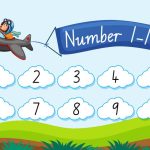‘A Cow that can jump over the Moon?’
Why, that’s incredulous!
That is in all probability, the first thought that will spring into the mind of your Preschooler, when you sing them the Nursery Rhyme, ‘Hey Diddle Diddle.’
In only a short period of time, you will find that this precious Art of Storytelling has worked wonders when it comes to articulating your toddler’s Speech. Indeed, the power of Songs and Rhymes can never be underestimated, when it comes to kids acquiring the English Language in a way like no other.
In this article, we will take a good look at the Importance of Rhymes in Preschool Education. We will explore How to Enhance English Speaking Skills for Preschoolers, using those very rhymes. The goal of course, is making English Conversation for Preschoolers, a lot simpler than it would otherwise be.
Are you ready, to find out all about the Importance of Rhymes in Preschool, vis a vis kids acquiring English-speaking skills?
Let’s see, just how our children can ‘Rhyme’ their way towards a better understanding of the English Language!
The Importance of Nursery Rhymes in Preschool Education
Once they are done with their ‘ABCs’, things start to get a tad more ‘serious’. Or shall we say, more ‘fun’, with those Nursery Rhymes?
If you are looking at how to enhance English speaking Skills, rest assured you are in the right Classroom! In this section we will cover the varied benefits that Nursery Rhymes offer Preschoolers, where it comes to improving their grasp on the English Language.
The Introduction to ‘Sounds’
This is one Importance of Rhymes in Preschool that might seem pretty ‘basic’.
However, it is one that firmly entrenched the roots of ‘learning’ of the English language, in the hungry minds of Preschoolers.
Probably the first thing that little children are exposed to when they hear Nursery Rhymes, are the ‘Sounds’ made by those ‘Vowels’ and ‘Consonants.’ Oh, and we must not forget to give them credit, for putting together those Sounds, to create Words!
The Development of Speech
English Conversation for Preschoolers is made Simpler, when they listen to Nursery Rhymes over an extended period of time.
What those Rhymes do vis a vis Speech Development, is the following:
- They help them articulate words, through the process of constant repetition.
- They learn the art of Voice Modulation.
- They work on those muscles.
- Choose a Rhyme to Walk with.
- Don’t be Monotonous!
- ‘Rhyme of the Week.’
When you throw them a phrase like ‘The Wheels of the Bus go Round and Round’, you can rest assured that they will be repeating it over and over again, till you find them another rhyme!
Needless to say, things like ‘pitch’ and ‘volume’ are most important, to make those infectious rhymes sound a lot cooler!
Which muscles, you ask? Why, the Mouth and Tongue Muscles!
They are exposed to New Words
How many times do we introduce New Words to our little ones? We are forever teaching them to drink ‘Milk’ and brush their ‘Teeth’, but how about exposing them to a word like ‘Pail’? As in, the ‘Pail of Water’ in the ‘Jack and Jill’ rhyme! Needless to say, this new word will be absorbed by those eager young minds like a Sponge, by the time they have listened to Jack and Jill for the umpteenth time!
It increases Phonological Awareness
Little children first have to get a firm understanding of the essence of Phonological Awareness.
In a nutshell, this term implies ‘The ability to work with Sounds in the Spoken Language’. Nursery Rhymes are a great way for children to harness this most vital skill, one that is mastered through the simple process of ‘Repetition.’ As we have already seen, there’s no better thing that kids would like to have repeated, than a Nursery Rhyme!
It hones their ‘Listening Comprehension’
Now that they have mastered the sense of ‘Sound’, it’s time to take things a step further!
Children have to be aware of the ‘Words’ that are separate in ‘Sentences’, when they listen to those sentences being spoken. Listening to Nursery Rhymes, is a great way to get them to do just that.
An Introduction to the Joy of Reading
Nursery Rhymes also serve as a wonderful introduction to the art of Reading. This is because, Nursery Rhymes
embody the most essential components of all great Stories – Beginning, Middle and End.
Note: Reading is especially wonderful, because all children out there can become good readers, in spite of the different social backgrounds they come from.
They help in Sentence Formation
‘Mama’ or ‘Dada’ might have been the first ‘word’ uttered by your child, but did you ever
stop to think what their first ‘sentence’ might have been?
If your child has been listening to Nursery Rhymes of late, there’s a good chance that one of those
Sentences in a Nursery Rhyme of their choice, might just be the very first sentence they uttered. It’s the sheer ‘simplicity’ and ‘succinctness’ of those sentences in Nursery Rhymes, that makes them easy for young learners to grasp.
Tips to Introduce Rhymes into your Child’s Daily Routine
Here are some cool tips that will get your kids Rhyming their way towards Mastering the English Language!
Whenever you are walking your child to some place like the Park, ensure you sing a rhyme along with them!
The last thing you want to do, is sing that Rhyme in a drab tone. Make sure you sing in a cheerful tone, and even use hand gestures for added effect.
This one is a rhyme that you must get your child to practice at least thrice a day for the assigned week, to help them benefit through that magical process of Repetition.
You can be assured that the Preschool Curriculum at EuroKids, is laced with plenty of Rhymes that will get your little ones ever closer to mastering the English Language. We encourage all parents to keep their children ‘Rhyming’, well after they have returned from school.
















